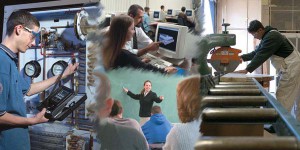Image Courtesy ofvalleytech.k12.ma.us
Vocational education paved the way for learners of all ages to acquire necessary skills for technical industries. In the past, it was integrated in the mainstream curriculum. Over the years, this integration between academic and technical education was phased out, creating a significant lack of qualified applicants for jobs involved in such industries.
It can be attributed to the disappearance of the previously blatant support of corporations to the technical curriculum. Before, companies involved in the technical market were offering partnerships for schools as part of their campaign to build a workforce. Today, less than likely will anyone find training services from private companies in the school system.
Indivisibility of education and work
In 1907, the Smith Vocational and Agricultural High School were institutionalized, becoming the very first technical school in Massachusetts. With its mission of preparing high school students for an academic diploma and an official Certificate of Occupational Proficiency, many schools all over the world have failed to make such seamless integration. Its emphasis is on building skills that aren’t easily taught within the four corners of the traditional classroom. These include analytical skills, resilience, teamwork, and work ethics and habits – all traits required for a successful professional life.
“Many of the skills most needed to compete in the global market of the 21st century are technical skills that fall into the technical/vocational area,” said San Francisco State University’s professor emeritus of secondary education Mark Philips. “The absence of excellence in many technical and vocational fields is also costing us economically as a nation.”
Social stigma of colored collars
Time and time again, students have had the pressure of keeping their skills in the dark due to the stigma that comes with ‘skilled labor’. For example, a high school senior who is interested in car engines and mechanics might want to develop this interest into a career, yet family and friends might convince him or her otherwise. The thought of making a career out of ‘hand-based jobs’ makes society cringe. Occupations such as massage therapy, cosmetology, and auto-mechanics are considered below than the regular 9-to-5 office desk job.
As a tip, how2become’s Richard McMunn said present your value as a potential employee. Provide the company you’re applying for the skill set you’ve gained and how you think it would be beneficial to them today and in the long run. It takes one confident applicant to defeat the social norm.
Other road to success and happiness
Unknown to some, a four-year degree is not the only way to achieve success at work. In fact, many jobs in our modern and global society can be considered vocational or technical. Many professional jobs also require certain vocational skills, and it reflects on the increasing mismatch between jobs and job seekers.
In the 21st century, technology drives technical education more than anything. There exist online portals and discussions, even going as far as becoming references for absolute self-study. Smartphones and tablets become Swiss army knives for all sorts of technical jobs that doesn’t require a full-blown desktop computer.
Ultimately, vocational education of both secondary and post-secondary tier should be given more attention. The old private-academia partnership might be a thing of the past, but the government has all the capability to create trainings and specialized classes. Additionally, the basic unit of the family is where everything should start.
“[B]eing able to begin legitimizing vocational education in a district may also depend on successfully re-educating parents regarding the value of occupations that aren’t high on the social status scale,” noted Phillips. Society has devalued manual skills. It’s time to reintroduce it as an equally valuable necessity as cognitive skills, and thus should be developed on a more local level.
Dennis Redley is a contributor to several e-publications and blogs centering on education technology. He has volunteered as a youth tech teacher in many boroughs, gathering experience for his future as a technology professor. You may talk to Dennis on Twitter @dredleyone.


Recent Comments